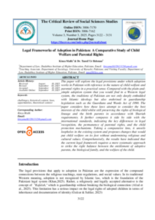The paper will explore the legal provisions under which adoption works in Pakistan with reference to the nature of child welfare and parental rights in a practical sense. Compared with the plain-and-simple adoption system that you would find in a Western legal system, the traditions of Pakistan are not only deeply embedded with Islamic ideology but also enshrined in guardianship legislation such as the Guardians and Wards Act of 1890. The paper considers how these laws attempt to consider the best interests of the child whilst still preserving the rights of biological lineage and the birth parents in accordance with Shariah requirements. It further compares it side by side with the international standards, indicating the key differences in legal recognition, the permanence of parental rights, and the child protection mechanisms. Taking a comparative lens, it unveils loopholes in the existing system and proposes changes that would put child welfare on its feet without undermining religious and cultural values. Comprehensively, the results have indicated that the current legal framework requires a more systematic approach to strike the right balance between the entitlement of adoptive parents, the biological family, and the welfare of the child.

